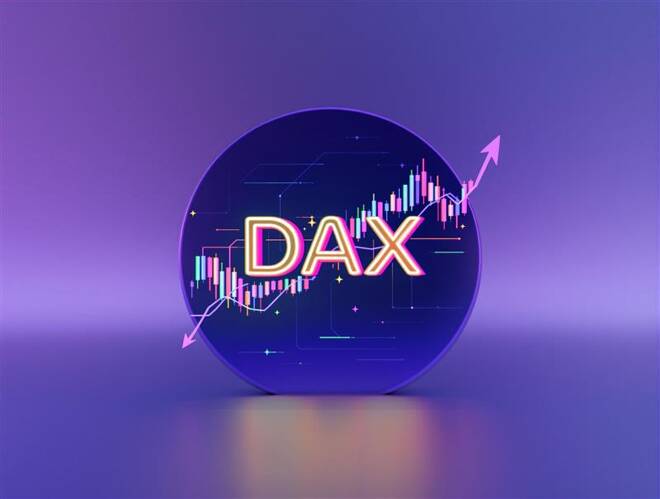Advertisement
Advertisement
Dax Index News: Bullish Forecast as DAX Rallies on Trade Hopes, Confidence Gains
By:
Key Points:
- The DAX surged 0.83% to 24,227 on May 27, hitting a record high of 24,301 before easing on US-EU tariff relief optimism.
- Germany’s consumer confidence rose to -19.9, while Eurozone sentiment also improved, boosting the economic outlook.
- The DAX outlook now hinges on German labor data and FOMC minutes; upbeat data may lift the index toward 24,500.
DAX Extends Gains on US Tariff Relief
The DAX gained 0.83% on Tuesday, May 27, building on Monday’s 1.68% rally, closing at 24,227. Significantly, the DAX climbed to a new record high of $24,301 before easing back.
US-EU trade developments boosted demand for DAX-listed stocks after President Trump’s tariff flip-flop on May 26. Trump appeared upbeat about reaching a US-EU trade agreement on May 27, stating,
“I have just been informed that the E.U. has called to quickly establish meeting dates. This is a positive event, and I hope that they will, FINALLY, like my same demand to China, open up the European Nations for trade with the United States of America. They will BOTH be very happy, and successful, if they do!!!”
Defense and Tech Stocks Lead Gains
Demand for defense stocks surged as the Ukraine war intensified, prompting President Trump to threaten more sanctions on Russia. Rheinmetall gained 2.55%, while MTU Aero advanced 1.26%.
Easing trade tensions boosted demand for tech stocks, with Infineon Technologies and SAP rising 1.89% and 1.28%, respectively.
Consumer Confidence Improves in Germany and the Eurozone
Germany’s GfK Consumer Confidence Indicator rose to -19.9 for June, up from -20.8 for May. Despite an uptick in the willingness to save component, the improvement signaled a potential pickup in consumption, bolstering the economy.
Sentiment across the Euro area also improved, with the Eurozone Consumer Confidence Index rising from 93.8 in April to 94.8 in May.
German Labor Market in the Spotlight
Focus now shifts to Germany’s labor market figures due Wednesday, May 28. Economists expect the unemployment rate to remain steady at 6.3% in May.
A tighter labor market may boost wage growth, potentially driving consumer spending, while higher unemployment may dampen it. Given private consumption represents over 50% of Germany’s GDP, household spending trends are crucial for the German economy.
Wall Street Soars on EU Tariff Delay
US markets soared on May 27 as investors reacted to Trump delaying 50% tariffs on EU goods until July 9. The Nasdaq Composite Index surged 2.47%, while the Dow and the S&P 500 rallied 1.78% and 2.05%, respectively.
A sharp rise in the US CB Consumer Confidence Index, from 87.5 in April to 98 in May, eased recession fears, contributing to Tuesday’s gains.
Fed Speakers and the FOMC Meeting Minutes Awaited
Later in the May 28 session, Fed speakers will be in focus ahead of the FOMC meeting minutes.
Fed insights into tariffs, inflation, and rate cuts will likely influence risk sentiment. Hawkish commentary, including support for delaying rate cuts to evaluate tariff impacts, could pressure global stocks. Conversely, support for rate cuts, based on a lack of evidence that tariffs have triggered inflationary pressures, could send the DAX higher.
Outlook: What Could Drive the DAX Next?
The near-term DAX trend will likely hinge on German data, trade headlines, and central bank guidance.
- Bullish Case: Easing trade trends, upbeat German labor market data, and dovish central bank cues could send the DAX toward 24,500
- Bearish Case: Renewed trade tensions, rising German unemployment, or hawkish central bank rhetoric could drag the DAX toward 23,750.
As of Wednesday morning, the DAX futures were up by 6 points, while the Nasdaq 100 mini dropped 10 points, suggesting a cautious mid-week session.
Technical Setup Suggests Cautious Optimism
The DAX remains above the 50-day and the 200-day Exponential Moving Averages (EMA), indicating sustained bullish momentum.
- Upside Target: A return to the May 27 record high of 24,301 could support a move toward 24,500. A sustained move through 24,500 would bring 24,750 into sight.
- Downside risk: A drop below 24,000 could expose 23,750, with further support at 23,500.
The 14-day Relative Strength Index (RSI) at 67.28 suggests the DAX has room to climb to 24,301 before entering overbought territory (RSI > 70).
Conclusion: Eyes on Data and Trade
Traders should monitor economic data, central bank statements, and trade headlines for guidance.
Explore our exclusive forecasts to see whether trade optimism can send the DAX to new highs. Read our latest DAX research and macro insight here.
About the Author
Bob Masonauthor
With over 28 years of experience in the financial industry, Bob has worked with various global rating agencies and multinational banks. Currently he is covering currencies, commodities, alternative asset classes and global equities, focusing mostly on European and Asian markets.
Advertisement
